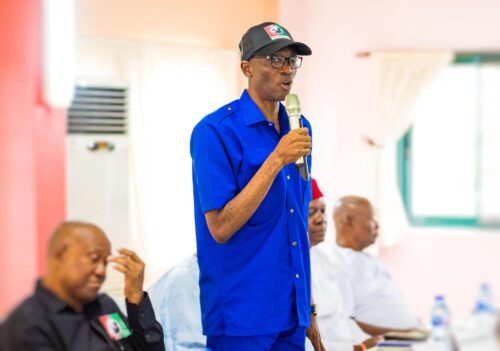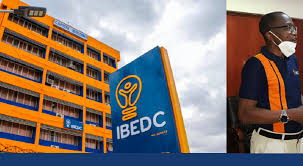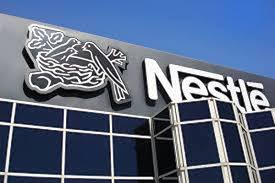We Need Peace, Good Ranch – Kara Cattle Market Chairman
The Kara Cattle Market on the Lagos-Ibadan Expressway is more than a place to buy and sell cattle. GBUBEMI GOD’S COVENANT SNR reports a community of many tribes and tongues devoid of politics, ethnicity and tribalism and, it doesn’t cost the earth to own or buy a cow.
The Kara Cattle Market situated in Isheri-Olofin area of the Lagos-Ibadan Expressway can be likened to a ranch without structures;short of the dirty strip of water that separates the Ojodu-Berger end of the Expressway from the market, every other requirement for a total cattle market is absent.
But beyond the filthy camp-like environment, Daily Timeswas greeted by a mixed bubbling community of Fulani, Hausas, Yorubas and some Ibos, young and old, even whole families all actively involved in one form of the business or the other.
After about ten minutes ofinteracting with sellers, buyers, butchers, our correspondent observed that the low literacy level in the community hasvery little to do with their ability to make intelligent business transactions. It was also noted that KaraCattle Market operates on a sound hierarchy of well- thought-out, functional administration.
Daily Times was able to locate the Chairman of the market with the help of an interpreter and a guide; but it was the peak of business, so an appointment was fixed for a Saturday morning the following week.The only impromptu matter he can attend to outside the cattle business is crisis management; there is no crashing into his daily itinerary.
It was amazing to find Saturday morning as busy as the working days of the week, but the interview held early enough to give him time for his business of the day.
Kara Chairman
AlhajiKolo S.A, the current Chairman of the Kara Cattle Dealers Association, in Lagos is fromGoneri village, in Gujuba Local Government Area of Yobe State, Nigeria.
A cattle breeder from his youth,Kolo decided to follow after his parents who were also in the cattle buying, grazing and trading business. But he started out on his own.
“I started by buying young cows from Fulani herdsmen in Maiduguri. I looked for young ones, and I would buy one male and one female as my money would reach; then I went to another market and I bought another female until I had three females and one male. Every year, the three females would bear one cow each.”
Daily Times learnt that cows do not breed multiple calves at once like most other animals. “Cows don’t give birth to two, only one at a time. And it is once a year. One female cow gives me one cow a year, and if the cow gives birth to a female, that female will grow and give me more cows.”
How does Kolo take delivery of the cows at birth?
“No, I don’t have to do anything until the calf comes out; the cows give birth by themselves. It is after the calf comes out that I will take it and clean it and we put it where it will stay. After two days, the calf will get up and can move around; it sucks the mother’s breast milk until it is old enough to feed on grass.”
What did it cost to buy a young cow at the time?
“That time, I bought one for N50,000, and after I trained them and they grew up, I sold them for at least N100,000 for one, but if the market is better, I can sell one for N120,000.”
Over time, Kolo grew enough in the business to buy ten cows at a time and was able to groom them in the bush until they had increased and matured. As his herd grew, Kolo began to think beyond the village environment.
“I had heard of Kara in Lagos and I followed people here many times to look at the place very well before I brought my own cows in 1973.
“After I sold them, I continued the business of buying here, training them and selling here in Kara market. That was how I built up my business.”
Kolo was assistant to the former chairman before he was elected unanimously seven years ago. He told of the structures put in place to control the influx of cows from other parts of the country into Kara market.
Market administration
“When any trailer comes here with cows, or anybody brings cows through any means, I interview him to know the source of the cows. I demand to know which state they are coming from, how they got the cows so I can distinguish the clean cows from the stolen cows.
“If I am satisfied with the source, I then inquire which fatuma (merchant/agent) they want to hand over their cows to, because everybody cannot come here with their cows and just begin to sell. We have fatumas who take delivery of cows and negotiate and sell the cows for them.So if they mention the
fatuma and I clear with the fatuma, I allow them to do business in the market.”
Buy here, sell here
“People think that buying cow is for the very rich, but it is not so. You can buy from N50,000 up to N250,000 and N300,000, according to the size and according to your pocket. You can negotiate of course, and you can even buy here, and resell the cow if you can drive a good bargain.”
On the state of cows sold at Kara, Kolo boasts:
“We take good care of our cows. We don’t sell any cow that is sick. We treat them first and make sure they are fit for the market before we sell.”
Buying and packaging
Daily Times was shown the slab where the business of slaughtering, butchering and packaging was at its peak as early as 9 a.m.
“If you want a cow for your party, you can buy and butcher it here; we have a team who can butcher and package your cow in bags neatly and you take it away in your car or van, and they don’t charge much money; I think around N7,000 or so; small money.”
Like every thriving market in the city, Kara has its share of touts and hustlers.
“Of course, we have touts who can find customers for fatumas”, Kolo said; “We even have some Yoruba touts here; sometimes they hijack anyone coming to buy and direct them to their contact; they can even help the buyer to bargain very well. Kara is an open market; anybody can come here and buy from anyone: we don’t have any problem with that.”
Kolo explained the presence of young and middle-aged Hausa and Fulanis in Kara:
“Those people are mostly Fulanis; they followed cows to this market. Their work is that when you bring your cows and you did not sell all of them, they are the people who will carry the cows to the bush for grazing; they also wash them and take them to drink water, then they bring the cows in the evening. That is their work every day, and they are paid for it. Those young boys and girls are their children because some have wives and they all live in this place.”
There could be a total of 500 cows at any one time in Kara market, depending on arrivals and daily sales. A minimum of 100 to 150 is the least recorded so far.
Generally, cow business is very good business because there really is no problem in the cow market.
Security
“In areas of security, because we move a lot of cash, we have police around us.If there is trouble, we settle it by ourselves, but if it goes beyond that, I call in the police.
“If we see anything suspicious, we call the police immediately and they arrest the situation. We also have mobile police surrounding us, so we are well secured.”
In the course of the interview, Kolo broke off several times to take calls on his cellphone; his fluency in Yoruba and English languages is commendable for an Hausa secondary school certificate holder.
Of his vision for the market in 10 years’ time, the chairman recalled that the State Government had made a commitment to upgrading the market.
“Lagos State Government promised to upgrade Kara to a modern cattle market. We have a cordial relationship with our host community and the government, so we have hope that one day the government of Lagos State will make this market better for everybody.”
Married to two wives, Kolo is all of 67 years andblessed with eight children and grandchildren, some of whom have travelled out of the country. He told Daily Times why he forbade any of his offspring from going into nomadic life or cattle business.
“I recognise that their generation is different from mine; so I want cow business to end with me. I have started a new generation of educated children and grandchildren and I am happy with that.”
Daily Times also sought out one Abubakar Adam, a radical Hausa-Fulani who introduced himself as Chairman of the youths in Kara market. Abubakar, who hails from Iganye, in Iganye Local Government Area of Adamawa State, has been in active cattle business in Kara for 12 years
More vocal on the condition of the cattle market, Abubakar did not mince words in expressing his dissatisfaction with the state of the market and the country generally. He told DailyTimes, “We are looking towards the time the country will have peace, because we’re now in pieces as it is; when the country has settled, then we are going to do this business progressively.”
Ranch option
“Yes, this is what we have been seeking from the government for a long time, but we haven’t got it. We long for a cattle ranch where our cows will stay and graze; we want a ranch where veterinary doctors will live and take care of our cows. We want water and electricity and we want a place where the families working will stay in the ranch and do their work in peace.
“We want a standard slab with all the facilities, and we want a model marketing part of the ranch so we can do business seriously,”Abubakar declared.
On the government promise mentioned by Chairman Kolo, Abubakar was not impressed.
“When we see what government is going to do about our problems, when government settles the problems, then we also will be settled.
“This place has been a temporary market for too long and we are not happy; we want a permanent place and we want it like a ranch with everything put in place. That is what will make us happy.”
Married with five children, Abubakar, like Kolo, would not want his children in the cattle business for obvious reasons.
“I don’t allow my children to be in this business because I like them to be educated; all of them are in school. I want to have engineers, doctors, scientists in my family and this is because the future of this business now is not good; that is why I don’t want our children in this business.”








